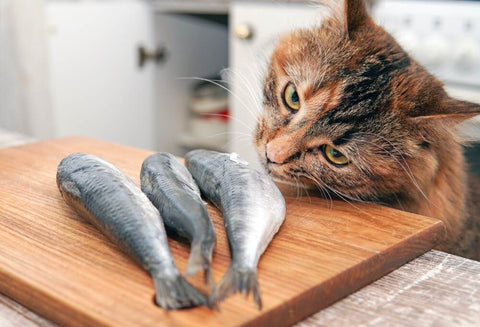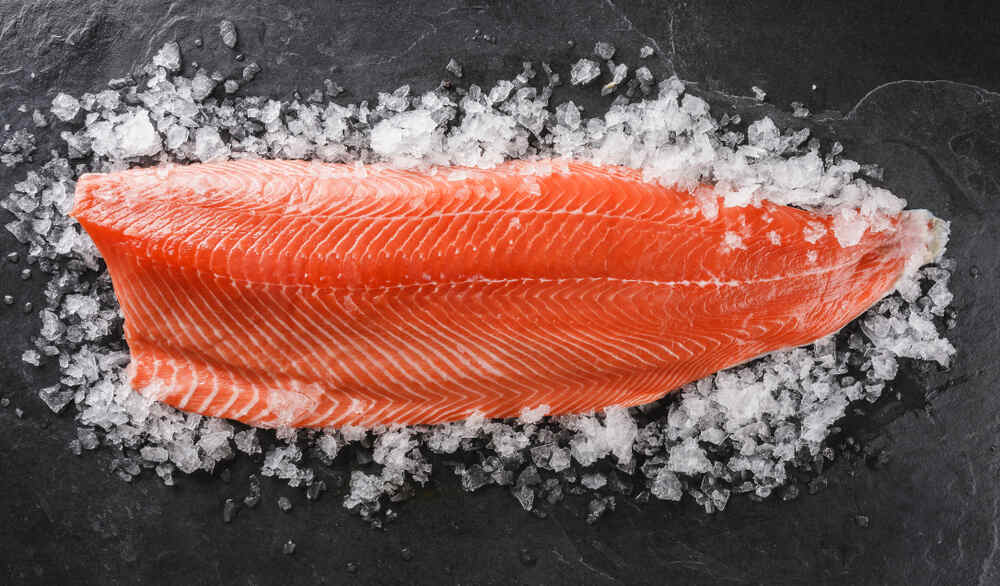Hey there, cat parents! Are you eager to introduce some variety and nutrition into your feline friend's diet? Fish might just be the purr-fect choice! In this blog, we'll cast a line into the "7 Best Types of Fish for Your Cat's Diet." You'll not only uncover which fish are ideal for cats but also explore the amazing health benefits they provide.
We'll dive into the ways you can support your cat's immune system, promote a soft, silky coat, reduce inflammation, and more! So, let's embark on a voyage through the seas of feline nutrition and discover which fish is the best fit for your beloved kitty!
The Benefits of Fish in a Cat’s Diet
Cats are known for their love of fish, and there are good reasons why! Not only do many cats have a natural craving for fish, but it’s also a nutritional powerhouse for feline health.
Not only can you feed your cat fish, but you should! Here are some reasons to ride the wave of seafood dinners for your kitty:
- Rich in Omega 3 and 6 Fatty Acids: Fish is a rich, natural source of Omega-3 fatty acids that are crucial for your cat’s health and wellness. Cats, like humans, require both Omega-3 and Omega-6 fatty acids for optimal health. Also like humans, cats cannot produce Omega 3s in their bodies, which means they need to get these essential fatty acids from their diet.
- Promotes Healthy Skin: Dreaming of transforming your cat’s coat from dull and dry to silky and smooth? Omega-3s support healthy skin and coats and can also boost immune systems. This is important because cats with allergies often experience chronic, year-round itching and skin inflammation. Fatty acids found in fish work double-duty to soothe the skin and support the immune system to reduce these symptoms.
- Eye and Brain Health: Just like in humans, Omega 3 and 6 fatty acids in seafood have been shown to improve both eye and brain health in cats. Studies have shown how docosahexaenoic acid (DHA) found in fish oil plays an important role in the development of kittens, especially when it comes to vision and cognitive performance.
- Diversity in Diet: Introducing fish to your cat’s diet adds variety. This can keep mealtime exciting for your kitty while ensuring they are still receiving a nutritionally balanced diet. No sacrificing nutrition for taste here!
Best Fish to Feed Cats

There’s a sea of options when it comes to choosing the best fish for cats to eat. However, not all fish are created equal! Let’s take a closer look at the best fish for cats and what makes them a great addition to your pet’s diet.
Wild Salmon
This delicious fish is considered to be one of the best fresh fish for cats to enjoy. It’s packed with Omega-3 and Omega-6 and is a safe and healthy choice for your cat.
- A Top Source of Omega-3 and 6: As we said before, these fatty acids are champions in promoting heart health, reducing joint inflammation, and supporting brain development. These “healthy fats” are vital for your cat’s diet.
- Beneficial for Immune Health: The rich fatty acid content in salmon does wonders for your cat’s immune system, helping them stay resilient against illnesses.
- Low Mercury Levels: Wild salmon has extremely low levels of mercury. This can provide you with peace of mind when introducing fish to your cat’s diet.
Wild Cod and Wild Haddock
Whitefish also packs a punch when it comes to nutrition and taste. This lean protein is a healthy addition to your cat’s bowl that will help to fuel playtime and boost their overall health.
- Lean Protein Source: Both wild cod and haddock are fantastic sources of lean protein, meaning they are high in protein and low in fat. This makes them an excellent choice for maintaining your cat’s muscle health without adding extra fat.
- Omega-3 and 6 Fatty Acids: While they may not have as many Omega-3 and 6 fatty acids as salmon, white fish is still a good source of Omega-3s and 6s.
- Low in Mercury: Like salmon, both cod and haddock have low levels of mercury, especially compared to their selenium content. Selenium is a mineral that helps counteract the potential risks of mercury toxicity, making these fish a safe option.
Acadian Redfish (also known as Ocean Perch)
This lesser-known fish also makes the list as one of the best fish to feed cats. Acadian Redfish is packed full of important vitamins and minerals while remaining low in fat.
- Nutritious: NOAA Fisheries highlights that redfish is a good source of niacin, vitamins B6 and B12, calcium, protein, phosphorus, and selenium.
- Lean Protein: Redfish is a good source of lean protein, essential for muscle development and maintenance.
- Low in Mercury: As with these other fish for cats, Acadian Redfish is low in mercury, making it a safe option for regular consumption.
Honorable Mentions
There are many healthy types of fish for cats. As we’ve said before, the best fish for cats often include oily fish like salmon, herring, and sardines. Here are some of these honorable mentions and a few more to consider.
Tuna
Light canned tuna is a good source of high-quality protein and omega-3 fatty acids. Cats also have been known to enjoy this oily fish. Make sure to choose a light canned tuna, since it is lower in mercury compared to other types. However, this treat should still be given in moderation.
Sardines
Another small, oily fish that is packed with nutrition. Sardines contain high levels of Omega-3 fatty acids, calcium, and vitamin D. They can also contribute to healthy bones and teeth and support heart health in cats.
Herring
Rich in fish oil, herring’s distinct flavor can be appealing to cats, adding excitement and variety to their diet. As an oily fish, it also contains Omega-3s to promote healthy skin and coat.
Whitefish (Pollock, Sole, and Catfish)
Other types of whitefish can also be good for your pet. While they may not contain as many fatty acids, these types of fish are low-calorie and easily digestible – perfect for cats who need some help with weight management or have sensitive stomachs.
By including fish like cod, haddock, salmon, redfish, and other seafood in your cat’s diet, you're not just feeding them; you're nourishing them with essential Omega fatty acids, lean proteins, and key vitamins and minerals.
Are you ready to embark on this exciting voyage with your kitty and switch to fish?




Comment
I am Just trying to educate myself about options for my cats food. My cat begs for canned white tuna daily but also is free fed dry Nutrish daily
I worry about mercury in tuna